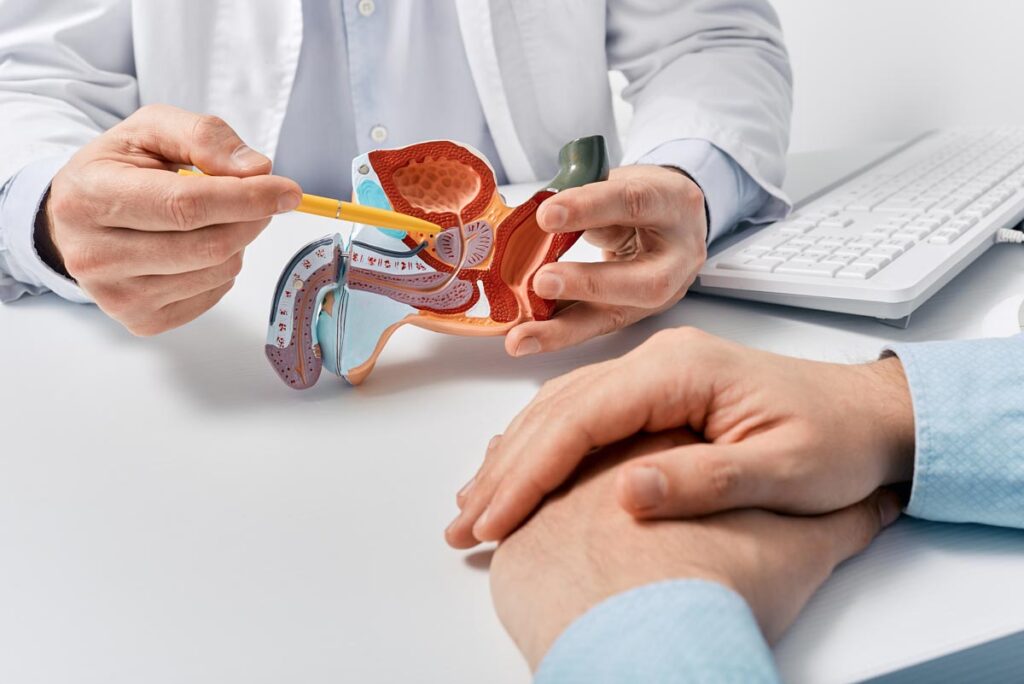Summary:Frequent ejaculation—more than 20 times per month—may lower the risk of prostate cancer and potentially reduce the risk of prostate enlargement, although it is not a guaranteed preventive measure. Prostate cancer can impact sexual health, primarily through treatment side effects, not the disease itself.
- Studies show regular ejaculation may reduce prostate cancer risk by roughly 20%.
- Prostate cancer treatments, like surgery and radiation, are more likely than the cancer itself to affect sexual function.
- Masturbation does not cause prostate cancer and may offer protective benefits.
- An enlarged prostate doesn’t directly cause ED but can contribute to sexual challenges.
- Safe, supportive intimacy remains possible during prostate cancer diagnosis and treatment.
The prostate gland’s major functions relate to sex, specifically ejaculation. So, it’s only natural to wonder if there’s a connection between medical issues related to this gland, like prostate cancer and enlargement of the prostate, and sex.
For example, does sex reduce prostate enlargement? Or, can a certain level of sexual activity lower an individual’s risk of prostate cancer?
The answers to some of these questions are relatively simple, while others are more complex. Keep reading to find those answers, and answers to many more questions related to prostate conditions and sexual activity.
Understanding Prostate Cancer and How It Can Affect Sexual Activity
What is Prostate Cancer?
The prostate is a small gland that is part of the male reproductive system. It sits beneath the bladder and in front of the rectum. It adds fluid to semen and helps move semen through the urethra, as well as helping to control the flow of urine from the bladder.
Prostate cancer – abnormal, uncontrolled cell growth of prostate cells – is a common medical condition that affects the prostate. As the Cleveland Clinic explains, prostate cancer is the second most common type of cancer found in men.
Prostate cancer is often slow-developing and doesn’t have symptoms in its early stages, making regular screening especially important. Prostate cancer can spread to other parts of the body and cause serious medical complications, up to and including death, if not treated promptly.
Although the precise causes of prostate cancer are not yet known, certain prostate cancer risk factors are widely recognized. These include advanced age, family history, certain inherited gene mutations, and diet, amongst others.
How Prostate Cancer Impacts Sexual Health
In the early stages, prostate cancer itself doesn’t physically cause sexual dysfunction, like impotence. However, a diagnosis can have a psychological influence that disrupts normal sex drives, as research published in the peer-reviewed World Journal of Men’s Health explains.
Also, as prostate cancer advances, it can lead to eventual physical issues that interfere with sexual function. Other symptoms of prostate health issues, including but not limited to prostate cancer, can have an indirect impact on overall attitudes toward sex and sexual performance.
For example, does an enlarged prostate cause ED? Not directly, but the urinary symptoms associated with an enlarged prostate could impact sexual confidence.
Additionally, many treatments for prostate cancer can lead to impacts on sexual health. Erectile dysfunction is a common side effect of treatments, especially the traditional treatments such as radical prostatectomy (removal of the prostate) and radiation therapy.
It is important to note that minimally invasive treatments (such as MRI guided laser focal therapy/focal laser ablation) compare favorably to traditional procedures in terms of the incidence of erectile dysfunction, but the risk is still present.
Some men who go through prostate cancer treatment also experience other sex-related concerns, including decreased libido, changes in orgasm, and ejaculatory issues. So, while prostate cancer itself can affect sexual health, treatment can lead to more significant and noticeable issues.
The Link Between Ejaculation and Prostate Cancer Risk
With an understanding of the links between prostate issues like prostate cancer and sexual function, it’s time to consider another aspect of this issue. Specifically, the potential links between sexual activity and potential benefits related to prostate health.
What the Research Says
Can masturbation cause prostate cancer? The answer is almost certainly no. It appears that more frequent ejaculation, whether from sexual acts with a partner or through masturbation, reduces the risk of prostate cancer.
Long-term research published in the peer-reviewed journal European Urology found that men who reported a higher ejaculatory frequency in adulthood than others were also less likely to be diagnosed with prostate cancer.
The Harvard T.H. Chan School of Public Health explained the research in more direct terms, noting that ejaculating more than 20 times per month led to a roughly 20% reduction in prostate cancer risk in comparison to ejaculating only 4-7 times per month. The article notes that this is just one of several studies that found a positive relationship between frequent ejaculation and lowered risk of prostate cancer.
The exact mechanism that leads to a reduced risk of prostate cancer with more frequent ejaculation is unclear. More frequent ejaculation helps to keep the fluid moving, which in terms helps decrease inflammation. It’s not clearly proven with prostate cancer, but in some other cancers, there is a clear link between certain types of inflammation and cancer.
Putting the Results into the Appropriate Context
No matter the direct cause, the positives are clear: More frequent ejaculation may help to reduce the risk of prostate cancer. However, remember that this is a correlation and not a guarantee – there is no proven causation. Increased ejaculation is not a perfect solution for avoiding prostate cancer.
One key factor to keep in mind in this context is that ejaculation can be a very low-risk activity that also offers several benefits. In other words, there aren’t many, if any, downsides in terms of safe sex or masturbation that leads to ejaculation, but there are some notable advantages.
It’s also important to recognize that frequent ejaculation is just one factor in reducing prostate cancer risk. A diet that limits red meat, dairy, and processed foods; staying active and managing weight; and avoiding smoking and limiting excessive alcohol use can also help reduce the risk of prostate cancer. Additionally, and crucially, regular screenings can help to identify prostate cancer before it advances, offering more options for treatment.
FAQ: Ejaculation, Prostate Health, and Related Concerns
So, we know that masturbation and ejaculation in general do not appear to contribute to higher rates of prostate cancer – quite the opposite, in fact. Now, let’s look at some other common questions related to prostate health issues and sexual activity, along with their answers.
Does Sex Reduce Prostate Enlargement?
Although not definitively confirmed, it appears that a consistently higher frequency of ejaculation can decrease the risk of prostate cancer, benign prostatic hyperplasia (BPH – a noncancerous enlarged prostate), and lower urinary tract symptoms. Research published in the peer-reviewed Journal of Urology offers more details about this connection.
Can Masturbation Cause Prostate Cancer?
There does not appear to be a connection between masturbation and increased risk of prostate cancer. As explained in the previous section of this article, regular ejaculation of more than 20 times per month correlates with a reduced prostate cancer risk as compared to regular ejaculation of 4-7 times per month.
Does An Enlarged Prostate Cause Erectile Dysfunction (ED)?
An enlarged prostate is not a common cause of erectile dysfunction directly. However, the urinary symptoms of an enlarged prostate, like difficulty urinating, dribbling, and a frequent need to urinate, can cause a loss of sexual confidence as well as performance on a psychological level.
This is a psychological issue caused by a diagnosis and symptoms that don’t impact the physical ability to achieve and maintain an erection, or to ejaculate. However, the issue is real nonetheless – an enlarged prostate can indirectly cause ED.
It’s also worth noting that certain medications used to manage an enlarged prostate, can have sexual side effects. In a physician-reviewed article, WebMD explains that 5-alpha-reductase inhibitors and alpha blockers are two common medications used to treat BPH. These medications both can have sexual side effects, including possibly ED and reduced libido.
Can a Man With Prostate Cancer Affect a Woman?
Like all cancers, prostate cancer is not contagious, as the American Cancer Society explains. Men cannot pass cancer onto their partners, whether male or female, through sexual contact. There is no medical risk in terms of partners being intimate when one has a prostate cancer diagnosis.
However, many treatments for prostate cancer present a risk for ED (minimally invasive procedures compare favorably to traditional procedures in this regard, although a certain amount of risk is still present). If a man experiences ED because of treatment, or due to the psychological impact of a prostate cancer diagnosis, this can affect his partner.
Absent the intimacy component, the psychological distress caused by a prostate cancer diagnosis can also affect a partner. This is a time when a partner needs to support and help their spouse as he deals with a major change to the way he perceives his health.
Options for Prostate Cancer and BPH Treatment
Prostate Laser Center is dedicated to offering MRI-guided, minimally invasive treatments for prostate cancer and BPH. Learn more about qualifying as a patient and our approach to treatment by requesting a free consultation.
NOTE: The information provided on this website is general medical information and does not establish a physician-patient relationship. Please discuss your particular situation with a qualified medical professional.



